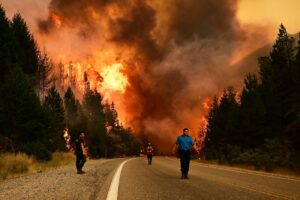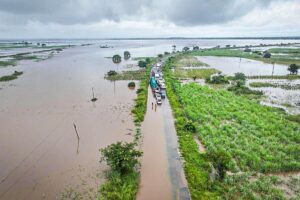At COP28 in Dubai, Carbon Brief’s Anika Patel spoke with Prof Pan Jiahua, vice-chair of the national expert panel on climate change of China, about his ideas for how to move to a zero-carbon future.
This interview covers a wide range of topics, including China’s stance on fossil fuels, the concept of an “ecological civilisation”, the usefulness of a global “loss-and-damage fund”, and prospects for distributed solar and power market reform in China. It is transcribed in full below, following a summary of key quotes.
China’s national expert committee on climate change, of which Prof Pan is vice-chair, is an advisory body under the national leaders group on climate change, energy-saving and emissions reduction.
He is also a member of the Chinese Academy of Social Sciences and director of its Research Center for Sustainable Development, as well as director of Beijing University of Technology’s Institute of Eco-Civilization Studies and a member of the China Carbon Neutral Fifty Forum.
- On the philosophy of ‘ecological civilisation’: “Human beings, for their own benefit – they ignored the benefit of nature. The welfare of nature. We expose nature, we deplete our natural resources…[Under ecological civilisation] the basic idea [is] that [if we can achieve] harmony with nature [and] harmony among our nations, then we can go long into the future.”
- On the success of UN climate summits: “COP is the only thing that [has lasted] over 30 years…We have different views, different arguments, different interests but, all in all, we’ve come a long way…we agreed the Paris targets – in 1990 nobody would believe that [was possible].”
- On the ‘loss-and-damage fund’: “Losses and damages should be compensated, but not in a way that we divert our energy and resources for [the sake of] compensation. We should use all our energy, resources, spirits – everything – for the zero-carbon transition.”
- On the ‘climate paradox’: “If you divert the limited resources for compensating losses and damages, then the zero-carbon transition would be delayed. And if you delay such a transition, there will be more and more losses and damages. I call this the climate paradox.”
- On tripling renewable energy: “Tripling renewable energy is not enough. Why are we only tripling? Why not more and more, the more the better. Because look at China – [we] doubled and doubled and doubled [our renewable energy] all the time. This year we doubled installed capacity over the last year. Why shouldn’t we do more than just tripling?”
- On replacing energy infrastructure: “Renewables would not require a huge amount of investment in infrastructure. Fossil fuels, coal electricity generation – the investment is very capital intensive…right? Waste of money.”
- On subsidies and industrial policy: “Like a plant – in the very beginning when it’s a seed then you need to take care of it. But when it grows and becomes mature, then it can stand on its own and be competitive.”
- On an alternative to a centralised electricity grid: “I use the term ‘prosumerism’. Production, consumption and storage all in one, right? You do not require a very capital intensive power grid.…And also, this is consumer sovereignty – when you have your own system, you have a say and then…you are not totally reliant on the power grid.”
- On western suspicion: “Why did China suddenly become number one in zero-carbon renewables? It’s simply because the United States and Europe used anti-dumping subsidies and section 301 investigations in 2010. Then the Chinese competitive products, solar panels, were not able to go to the world market, so we thought we should…install everything inside of China and immediately China became number one in the world. Now you see the United States and Europe again say ‘no, it’s [a question of] supply chain security’. Right? This is really self-conflicting. On one hand they say ‘climate security’, on the other they say their ‘own security’.”
- On phasing out fossil fuels: “We want to have everything competitive enough to phase out fossil fuels, through the market process. Not command and control.”
- On abating fossil fuels: “I think that abated fossil fuels is a false statement. Because abated is not compatible, they have no competitiveness. When you abate it, it is more expensive. You think the consumers are silly? They will simply vote for competitive[ly priced] electricity.”
- On the future of fossil fuels: “Fossil fuels are fossils. They are a thing of the past.”
- On the ‘global stocktake’ negotiations: “[We talk about] responsibility sharing, carbon emissions reduction. But everybody will say ‘No, I will not [accept] any limits. You want to limit me, I want to do more.’ This is human psychology, right?”
- On the challenges of power market reform: “Only the monopoly people will [call for] ‘reform’, and through reform they gain more power, they gain more monopoly. The prosumerism system will destroy such monopolies.”
- On the urgency of ‘global boiling’: “Global warming is not global warming, it’s global boiling…Renewables are good for welfare, for wellbeing, for growing the economy, for a better environment. It’s for everybody and for the future. Fossil fuels are not for the future.”
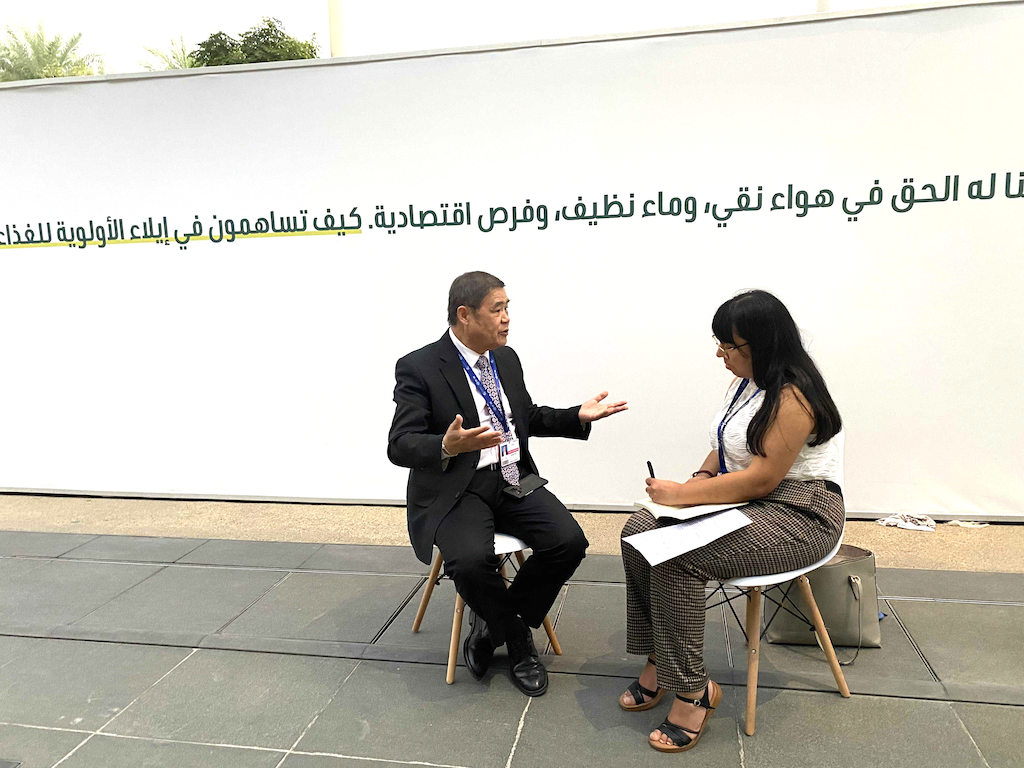
Carbon Brief: If you don’t mind, I’d like to jump straight in. I read a lot about your work on defining the concept of an ecological civilisation, which is a concept that’s not very well understood outside China. In your previous work, you’ve described it as realising harmony between humans and nature in contrast to industrial civilisation. Could you give an overview of what an ecological civilisation is and how this concept has evolved?
Pan Jiahua: Well, from [the beginning of] human civilisation, from primitive agrarian society, human beings have relied somewhat completely on nature. The ability to live more comfortably was very limited and then, with technological innovation and the industrial revolution, we have entered the new era: the industrial stage. A sort of industrial civilisation.
Under industrial civilisation, we have an ethical principle, which is utilitarian. Measurement of happiness in human beings – we would like to be happy – and how to measure happiness? Then the British philosophers, they invented the idea of utilitarianism, which means that, once you have some sort of self-interest, self-achievement or self-realisation, then you are happy. And then happy, you need some sort of measurement. That is utilitarianism, everything is useful, everything brings you benefits, then you would be happier, right? This is utilitarian. And then the measurement in economic terminology, that is utility right? Everything has a utility and then that brings happiness to human beings. So that is utilitarianism, and then when there is no utility, then there is nothing to bring you happiness.
So this is the philosophy, the ethical foundation or ethical principle. And let’s put it another way: because of this ethical principle, that means that everybody tries to optimise his own utility. At the same time, when he maximises his own utility, he tries to provide services to other people and then the social welfare, social wellbeing in total is further improved, right? So this is the whole idea of the industrial revolution and industrialisation, that everybody would benefit.
But now, because human beings, for their own benefit – they ignored the benefit of nature. The welfare of nature. We expose nature, we deplete our natural resources, you know? And then nature is depleted and nature is destroyed, damaged, lost. And then we found that: “Oh my god, this is not sustainable.” We need to change back our principle, and not be utilitarian. We need to have something in harmony with nature, right?
Now, when we talk about security, right? Under an industrial utilitarian principle, security just [means] your own security – like the United States, like Donald Trump saying “America first”. The others, they are nobody, just America first. Others are secondary or tertiary or not important at all, only the United States is the most important. Right? Let’s get a slogan ‘America First’, so the others are not important and now it is the same. They talk about national security, their own security. The others, they don’t care. Like Russia’s own security. The others’ security is not on their agenda, right? So this is utilitarianism, this is self-interest. [Under the concept of ecological civilisation], security is not only for one but for all, for everybody, for man and nature.
CB: And does this include energy security?
PJH: Of course, energy security is one of many securities. So we need to understand security through a new mentality. This mentality has security for all. All the securities are important and should be treated equally, not that one security is superior to the others, all securities are important, should be treated equally, right? So this is harmony between man and nature. That means that not only in the United States, Russia, China, other developing countries – they should be treated equally. Your security, Russian security, Chinese security, all the securities should be treated at a similar level, as equally important. So this is a harmonious society, a harmonious world, harmonious human beings. Otherwise just your own security, the others’ security, they are not secure, and then how can they be guaranteed?
So this is the logic, and then, human beings are part of society, we are part of [the community of life on] Earth. Human beings are all one race. We have so many other species. Other species should also be treated equally. Their security, the plants, the animals and all the other forms of life. They should be treated equally, their security, not only human beings’ security, the security of nature, security of better diversity. So, this is all the securities, man and nature in harmony, living in harmony with nature. This is the principle. This principle is different from utilitarianism. That means on Earth we all are one community, an Earth community, a life community, we share our own planet, we share our future, not only one nation, one race, but everybody – not only [the] current generation, but future generations as well. So this is the basic idea that [if we can achieve] harmony with nature [and] harmony among our nations, then we can go long into the future. Otherwise, there’s conflicts among our nations, conflicts among culture, and then conflicts between man and nature. And then we will not have a future.
CB: You’ve actually teed up my next question really well. Given these hopes for harmony between different countries and harmony between man and nature, do you see the seeds of harmony at COP28?
PJH: I think that COP is the only thing that [has lasted] over 30 years. In 1990, when the United Nations created the intergovernmental negotiation committee, which resulted in the UNFCCC – this was agreed in 1992, and then in 1994 it came into force. This is the only one that lasts so long. And we have different views, different arguments, different interests but, all in all, we’ve come a long way, and now we come together and we agreed the Paris targets – in 1990 nobody would believe that [was possible]. “Oh no, global warming, that’s not my business, that’s something the rich guys should do, not us poor guys.” Right? And then at Copenhagen, when the 2C target was included in the Copenhagen Accord, that was no success at all.
And then, only five or six years later in 2015, we successfully completed the Paris Agreement. Not only 2C but 1.5C as well. And now step by step we come to a consensus. 1.5C should be the target and all our efforts should be focused on complying with 1.5C, and that’s the target. I think that’s why, in the UK for COP26 in Glasgow, [we had] 1.5C and then last year, at COP27, 1.5C was reiterated and reaffirmed, and this year [2023] I think that we should have no dissenting voices, right? So this is a great achievement and that means that all human beings can reach a consensus and can go further and further continuously. In the past, we would take a step forward and then go backward. And now at the climate conferences, we always go forward and make progress all the time. So this is really great.
But now I do have a different view. That is the global stocktake. I think that this is necessary, but [within the] global stocktake there are quite a few that are on a set track – [will they] derail or progress?
One is the “loss-and-damage fund”. Some people say that, okay, the climate morale requires the most vulnerable nations to be compensated for climate damages and climate losses. When on the first sight, it is reasonable, it is based on climate morale because they are not at any fault [for climate change] and they are suffering, so they should be compensated. I have a different view. Losses and damages should be compensated, but not in a way that we divert our energy and resources for [the sake of] compensation. We should use all our energy, resources, spirits – everything – for the zero-carbon transition. Because if you divert the limited resources for compensating losses and damages, then the zero-carbon transition would be delayed. And if you delay such a transition, there will be more and more losses and damages. I call this the climate paradox. The paradox of climate and morale.
CB: So is it a battle between short-term and long-term thinking?
PJH: No, it’s not short-term and long-term. You know, the mentality is not right. The mentality is that the focus should be zero-carbon transition. Because if you spend your time, resources, energy, negotiating the losses and damages fund – who suffers and who should pay and how the resources should be allocated – this is a waste of resources and a waste of time. Instead, we should focus our attention on zero-carbon transformation. Everything should be zero-carbon. All the people, all the countries, all the parties, all the resources: zero-carbon. And then, in the future, we would minimise our losses and damages. Otherwise, we will divert limited resources and then we will not be able to concentrate our efforts on zero-carbon transformation. So this is the mentality. I think that [the purpose of the] loss and damages [should] not be for compensation but for zero-carbon transition, zero-carbon transformation, zero carbon development.
Now if we see zero-carbon development, it is high quality. For instance, solar energy. Instead of compensation for losses and damages, you install solar panels and then you have energy. That is well-being, that is income, that is ability to develop, instead of some sort of imaginary losses and damages. Right?
CB: A critic might say, firstly countries are pledging to triple global renewables – so there is still focus on mitigation – but they might also say that countries that are seeing their infrastructure destroyed, for example through conflict, have the opportunity to develop new low-carbon infrastructure.
PJH: This is wrong. For one thing, tripling renewable energy is not enough. Why are we only tripling? Why not more and more, the more the better. Because look at China – [we] doubled and doubled and doubled [our renewable energy] all the time. This year we doubled installed capacity over the last year. Why shouldn’t we do more than just tripling? Insufficient, not enough, we should do more and more and more and more, not only tripling, it is not enough.
And the second thing: when you talk about replacing energy infrastructure. Renewables would not require a huge amount of investment in infrastructure. Fossil fuels, coal electricity generation – the investment is very capital intensive. It would require investment of a huge amount of money for construction of the thermal power plants, it would require a huge amount of investment into the power grid and distribution. Right? Waste of money.
If you go to zero-carbon solar panels on top of your roof, you have your electricity. And then when it’s intermittent, you see [we have] power batteries, which are so cheap. You should go to China to have a look at power batteries – 20 years ago, who would have imagined that electric vehicles would be competitive. Even three years ago nobody [would have thought so]. And now you see, [they are] so competitive.
CB: That’s so true, in my Beijing apartment, we didn’t have solar panels, but we did have EV charging points.
PJH: Right? So that means the infrastructure, everything is under your own control, you will not be reliant on capitalists. So that is the difference, right? Infrastructure. That’s why I say the “loss-and-damages fund” does nothing. Just zero-carbon transition, zero-carbon energy, zero-carbon development, zero-carbon welfare, zero-carbon well-being.
CB: To take China as an example, do you think that there’s more public consciousness around zero-carbon development? EVs makes sense because they were subsidised until recently –
PJH: They’re not subsidised any more. But you’re right, in the past it was. Everything, at the very beginning, was. Just like how when new babies are born, you should take care of them. That’s true for everything new. That’s natural, like a plant – in the very beginning when it’s a seed then you need to take care of it. But when it grows and becomes mature, then it can stand on its own and be competitive.
CB: So then, from the consumer’s point of view, are people interested in solar panels on their rooftops, recycling, things like that?
I think that this [consumer-based approach] is comprehensive and is inclusive. Everybody can contribute, to zero-carbon, to plastics, to energy, right? If you reuse materials, then you will reduce emissions. You would delay the depletion of fossil fuels. Right? So this is one of the approaches. All approaches combined leads to consensus, which is a Chinese value.
Renewables are competitive, electrical vehicles are competitive and batteries have huge potential, and everybody has high expectations that these batteries would become more and more competitive, and then every household, every school can be an independent unit. I call it “prosumerism”. Production of solar and [wind] turbines fuels generation of electricity, that’s production right? And consumption is kitchen utensils, heat pumps, air conditioning, light, everything – consumption. And then you have your storage – power batteries, right? Because of the intermittency of solar, the challenges can be resolved through power battery storage.
So I use the term “prosumerism”. Production, consumption and storage all in one, right? You do not require a very capital intensive power grid. That’s very impressive. And also, this is consumer sovereignty – when you have your own system, you have a say and then…you are not totally reliant on the power grid. If [the grid operators] say something is wrong, then you have no control, if they increase the price, then you have to accept it, you have no argument, everything is under their control. With prosumerism, everything is under your own control. I call it consumer sovereignty.
So why should developing countries spend money and waste money on the power grid? Just [adopt] an independent prosumerist system.
CB: I think the EU and the US now recognise they need to catch up with China’s solar industry, and we see them recognising the benefits of nurturing their “baby” industries –
PJH: Let me tell you, the EU and the United States, they always say one thing and do another, they’re very contradictory. Why did China suddenly become number one in zero-carbon renewables? It’s simply because the United States and Europe used anti-dumping subsidies and section 301 investigations in 2010. Then the Chinese competitive products, solar panels, were not able to go to the world market, so we thought we should do everything ourselves – then suddenly we should install everything inside of China and immediately China became number one in the world. Now you see the United States and Europe again say “no, it’s [a question of] supply chain security”. Right? This is really self-conflicting. On one hand they say “climate security”, on the other they say their “own security”. They don’t care about others, they don’t care about the climate. Because Chinese products are the most competitive in the world. If they are competitive, then everybody gains the lowest cost for installation of solar and wind.
CB: That’s very valid from a consumer point of view. I think everyone recognises that China is growing its renewable capacity at such a high rate, but can it sustain that indefinitely? Or will renewable energy eventually plateau? And at what point will it plateau?
PJH: I think that this is a good question. You know, for everything we have a process of very, very slow progress and then, suddenly, we have acceleration and we go to maturity. Once you get to maturity, you do not [need as much support], because, [like] human beings…once you are big enough, you do not require too much to eat, you do not require more food, right?
It’s the same, when zero-carbon energy is sufficient to meet your demand, that is enough. You do not need to produce more for nothing, for wasting, right? So that answers your question, that is when we have sufficient capacity, then there’s no need to produce more for China. But we do have [to have] such capacity, [because] we need renewables. We do have to have new technologies, right? It’s progress for China.
Now I think that we are developing very fast, we want to have everything competitive enough to phase out fossil fuels, through the market process. Not command and control. Use market forces to phase out fossil fuels because now, you see solar electricity, wind electricity, it’s only a fraction of coal-fired electricity, that’s still competitive. And now the intermittency challenge is resolved through storage, because what we need is energy services. We do not require carbon dioxide. Carbon dioxide is nothing.
CB: To clarify, you’re not talking about phasing out unabated fossil fuels, you’re talking about phasing out all fossil fuels?
PJH: I think that abated fossil fuels is a false statement. Because abated is not compatible, they have no competitiveness. When you abate it, it is more expensive. You think the consumers are silly? They will simply vote for competitive[ly priced] electricity. Right? So, I think that abated fossil fuels is a false statement. It does not stand. You know what I mean?
It is really a silly statement. I’ll give you an example – gasoline automobiles. Nowadays in China, you see the young people, who cares to buy [gasoline vehicles]? You have no market at all, nobody cares, nobody buys. Purely electric vehicles – that’s the market. Gasoline vehicles, no matter if they are ‘abated’ or ‘unabated’ – nobody cares. This is one illustrative example. So, the [idea of] abated fossil fuels really is nonsense. Nonsense.
CB: You mean that both the idea of unabated and abated fossil fuels are nonsense?
PJH: Both. Zero-carbon renewables are so competitive. They simply bring more employment, more revenue, better health and wellbeing. Right? And they give zero-carbon emissions. There are multiple wins.
CB: We’ve seen reports of particularly local governments building more coal capacity, perhaps to boost local economic growth. What do you think it would take –
PJH: You are right. In all societies, different people and different groups have different interests. For fossil fuels, in the past they were so powerful. They want to keep their power, they want to keep their influence, they want to keep their monopoly. It’s understandable. I don’t care at all – “okay, you do it”. But the next day, you guys realised it was wrong.
So I don’t care at all, [even though] so many people say in China local governments and state power companies are investing a huge amount in coal power. Never mind. They will be phased out automatically through the market. As I said, it is not command and control [that will drive the energy transition]. It’s market forces. It’s market power. Believe in market power.
CB: I heard someone make the argument that, as China tried to control the impact that the Covid-19 outbreak had on the economy, that coal interest groups may have lost some of their power and ‘new energy’ interest groups may have gained some power. Would you agree?
PJH: Well, we really don’t need to worry about this. The coal and fossil fuels industries are very powerful – state-owned and state-dominated. Very powerful. But I think “Okay, you are powerful. But, the sooner solar is [widely adopted], everybody can do it themselves, then we do not have to rely on them. We can let them be.” No matter how powerful they are today, I have no confidence that they will continue to hold a monopoly in the future, like the automobile sector. You know, in China automobile companies were state-owned companies, and so powerful in the past.
Now the evidence shows that fossil fuels are fossils. They are a thing of the past, they have no future. That’s why I think the global stocktake at COP28, the direction is wrong. We say “Oh the emissions reduction gap.” The gap is nothing.
CB: So what language do you expect to see out of the global stocktake?
PJH: The current language is wrong. [We talk about] responsibility sharing, carbon emissions reduction. But everybody will say “No, I will not [accept] any limits. You want to limit me, I want to do more.” This is human psychology, right? And so you say “No limits, you just do what you can.”
Zero-carbon renewable energy will bring employment, growth of the economy, wellbeing and a better environment. One example is electric vehicles: 100 kilometres (km) of drive, in China’s case, requires 12 kilowatt-hours (kWh) of electricity. 1 kWh of electricity, if you use solar together with power storage, would cost four, or at most five, US cents. Only five cents. That means that, less than one dollar – maybe 60 cents – will give you 100km distance, right? Using gasoline costs 10 times more. Consumers have the choice, it’s as simple as that.
If everybody knows that, who would say “Oh I want more fossil fuels, I want more emissions”? Emissions [would be] nothing, nobody [would need to] care about emissions. So I think that we should go in the right direction. Renewables, zero-carbon, that’s the right direction. Renewables, power batteries, electric vehicles, heat pumps. All of these are [good] for development, for quality of growth, for quality of living. That is the right direction, instead of [focusing on] “limit, limit, reduction, reduction”. Psychologically, nobody would accept limits. So that’s the logic – for growth, for the environment, for better wellbeing, that’s the logic.
CB: Will this be accelerated by expected reforms to the power spot market?
PJH: The power spot market, that’s also what the monopoly people will say. Right? And then if we [adopt the] prosumerism system, there’s no need to reform, right? We have millions and billions of [sources for] prosumerism. One household is a prosumerist unit. The market has nothing to do with the individual prosumerist system. Right?
So only the monopoly people will [call for] “reform”, and through reform they gain more power, they gain more monopoly. The prosumerism system will destroy such monopolies. I have my own system, I consume the electricity I generate, I can have everything stored in my own battery and I drive my electric vehicle. I have an independent, self-sufficient system. With monopolies – like the oil companies – the price is so volatile, because they want it to be volatile, so they can monopolise more and they can control the price. Now with electric vehicles, the oil companies are not able to control the drivers. Reform has nothing to do with it.
CB: Moving towards a zero-carbon society?
PJH: Exactly, that’s why [we are advocating for] the prosumerism system…we are going to do it inside China and then we’re going to introduce it to the world. We see a zero-carbon energy prosumerism system as a solution to a carbon neutral world. And then, in the prosumerist system, all the oil companies, all the fossil fuels – they are nobody, they are nothing. Consumers, households, they won’t care [about the fate of these companies]. That’s the solution, instead of price reform – that’s really the wrong direction. I am very confident that we have a solution, that’s the zero-carbon prosumerism system.
CB: Thank you professor. And, for my last question: do you talk to your friends and family about climate change?
PJH: Of course! Global warming is not global warming, it’s global boiling. We cannot stand, our biodiversity cannot stand, our future will not be able to sustain. So we have a solution – that’s renewables, and just renewables. Renewables are good for welfare, for wellbeing, for growing the economy, for a better environment. It’s for everybody and for the future. Fossil fuels are not for the future.
The post The Carbon Brief Interview: Prof Pan Jiahua appeared first on Carbon Brief.
Greenhouse Gases
Cropped 25 February 2026: Food inflation strikes | El Niño looms | Biodiversity talks stagnate
We handpick and explain the most important stories at the intersection of climate, land, food and nature over the past fortnight.
This is an online version of Carbon Brief’s fortnightly Cropped email newsletter.
Subscribe for free here.
Key developments
Food inflation on the rise
DELUGE STRIKES FOOD: Extreme rainfall and flooding across the Mediterranean and north Africa has “battered the winter growing regions that feed Europe…threatening food price rises”, reported the Financial Times. Western France has “endured more than 36 days of continuous rain”, while farmers’ associations in Spain’s Andalusia estimate that “20% of all production has been lost”, it added. Policy expert David Barmes told the paper that the “latest storms were part of a wider pattern of climate shocks feeding into food price inflation”.
-
Sign up to Carbon Brief’s free “Cropped” email newsletter. A fortnightly digest of food, land and nature news and views. Sent to your inbox every other Wednesday.
NO BEEF: The UK’s beef farmers, meanwhile, “face a double blow” from climate change as “relentless rain forces them to keep cows indoors”, while last summer’s drought hit hay supplies, said another Financial Times article. At the same time, indoor growers in south England described a 60% increase in electricity standing charges as a “ticking timebomb” that could “force them to raise their prices or stop production, which will further fuel food price inflation”, wrote the Guardian.
‘TINDERBOX’ AND TARIFFS: A study, covered by the Guardian, warned that major extreme weather and other “shocks” could “spark social unrest and even food riots in the UK”. Experts cited “chronic” vulnerabilities, including climate change, low incomes, poor farming policy and “fragile” supply chains that have made the UK’s food system a “tinderbox”. A New York Times explainer noted that while trade could once guard against food supply shocks, barriers such as tariffs and export controls – which are being “increasingly” used by politicians – “can shut off that safety valve”.
El Niño looms
NEW ENSO INDEX: Researchers have developed a new index for calculating El Niño, the large-scale climate pattern that influences global weather and causes “billions in damages by bringing floods to some regions and drought to others”, reported CNN. It added that climate change is making it more difficult for scientists to observe El Niño patterns by warming up the entire ocean. The outlet said that with the new metric, “scientists can now see it earlier and our long-range weather forecasts will be improved for it.”
WARMING WARNING: Meanwhile, the US Climate Prediction Center announced that there is a 60% chance of the current La Niña conditions shifting towards a neutral state over the next few months, with an El Niño likely to follow in late spring, according to Reuters. The Vibes, a Malaysian news outlet, quoted a climate scientist saying: “If the El Niño does materialise, it could possibly push 2026 or 2027 as the warmest year on record, replacing 2024.”
CROP IMPACTS: Reuters noted that neutral conditions lead to “more stable weather and potentially better crop yields”. However, the newswire added, an El Niño state would mean “worsening drought conditions and issues for the next growing season” to Australia. El Niño also “typically brings a poor south-west monsoon to India, including droughts”, reported the Hindu’s Business Line. A 2024 guest post for Carbon Brief explained that El Niño is linked to crop failure in south-eastern Africa and south-east Asia.
News and views
- DAM-AG-ES: Several South Korean farmers filed a lawsuit against the country’s state-owned utility company, “seek[ing] financial compensation for climate-related agricultural damages”, reported United Press International. Meanwhile, a national climate change assessment for the Philippines found that the country “lost up to $219bn in agricultural damages from typhoons, floods and droughts” over 2000-10, according to Eco-Business.
- SCORCHED GRASS: South Africa’s Western Cape province is experiencing “one of the worst droughts in living memory”, which is “scorching grass and killing livestock”, said Reuters. The newswire wrote: “In 2015, a drought almost dried up the taps in the city; farmers say this one has been even more brutal than a decade ago.”
- NOUVELLE VEG: New guidelines published under France’s national food, nutrition and climate strategy “urged” citizens to “limit” their meat consumption, reported Euronews. The delayed strategy comes a month after the US government “upended decades of recommendations by touting consumption of red meat and full-fat dairy”, it noted.
- COURTING DISASTER: India’s top green court accepted the findings of a committee that “found no flaws” in greenlighting the Great Nicobar project that “will lead to the felling of a million trees” and translocating corals, reported Mongabay. The court found “no good ground to interfere”, despite “threats to a globally unique biodiversity hotspot” and Indigenous tribes at risk of displacement by the project, wrote Frontline.
- FISH FALLING: A new study found that fish biomass is “falling by 7.2% from as little as 0.1C of warming per decade”, noted the Guardian. While experts also pointed to the role of overfishing in marine life loss, marine ecologist and study lead author Dr Shahar Chaikin told the outlet: “Our research proves exactly what that biological cost [of warming] looks like underwater.”
- TOO HOT FOR COFFEE: According to new analysis by Climate Central, countries where coffee beans are grown “are becoming too hot to cultivate them”, reported the Guardian. The world’s top five coffee-growing countries faced “57 additional days of coffee-harming heat” annually because of climate change, it added.
Spotlight
Nature talks inch forward
This week, Carbon Brief covers the latest round of negotiations under the UN Convention on Biological Diversity (CBD), which occurred in Rome over 16-19 February.
The penultimate set of biodiversity negotiations before October’s Conference of the Parties ended in Rome last week, leaving plenty of unfinished business.
The CBD’s subsidiary body on implementation (SBI) met in the Italian capital for four days to discuss a range of issues, including biodiversity finance and reviewing progress towards the nature targets agreed under the Kunming-Montreal Global Biodiversity Framework (GBF).
However, many of the major sticking points – particularly around finance – will have to wait until later this summer, leaving some observers worried about the capacity for delegates to get through a packed agenda at COP17.
The SBI, along with the subsidiary body on scientific, technical and technological advice (SBSTTA) will both meet in Nairobi, Kenya, later this summer for a final round of talks before COP17 kicks off in Yerevan, Armenia, on 19 October.
Money talks
Finance for nature has long been a sticking point at negotiations under the CBD.
Discussions on a new fund for biodiversity derailed biodiversity talks in Cali, Colombia, in autumn 2024, requiring resumed talks a few months later.
Despite this, finance was barely on the agenda at the SBI meetings in Rome. Delegates discussed three studies on the relationship between debt sustainability and implementation of nature plans, but the more substantive talks are set to take place at the next SBI meeting in Nairobi.
Several parties “highlighted concerns with the imbalance of work” on finance between these SBI talks and the next ones, reported Earth Negotiations Bulletin (ENB).
Lim Li Ching, senior researcher at Third World Network, noted that tensions around finance permeated every aspect of the talks. She told Carbon Brief:
“If you’re talking about the gender plan of action – if there’s little or no financial resources provided to actually put it into practice and implement it, then it’s [just] paper, right? Same with the reporting requirements and obligations.”
Monitoring and reporting
Closely linked to the issue of finance is the obligations of parties to report on their progress towards the goals and targets of the GBF.
Parties do so through the submission of national reports.
Several parties at the talks pointed to a lack of timely funding for driving delays in their reporting, according to ENB.
A note released by the CBD Secretariat in December said that no parties had submitted their national reports yet; by the time of the SBI meetings, only the EU had. It further noted that just 58 parties had submitted their national biodiversity plans, which were initially meant to be published by COP16, in October 2024.
Linda Krueger, director of biodiversity and infrastructure policy at the environmental not-for-profit Nature Conservancy, told Carbon Brief that despite the sparse submissions, parties are “very focused on the national report preparation”. She added:
“Everybody wants to be able to show that we’re on the path and that there still is a pathway to getting to 2030 that’s positive and largely in the right direction.”
Watch, read, listen
NET LOSS: Nigeria’s marine life is being “threatened” by “ghost gear” – nets and other fishing equipment discarded in the ocean – said Dialogue Earth.
COMEBACK CAUSALITY: A Vox long-read looked at whether Costa Rica’s “payments for ecosystem services” programme helped the country turn a corner on deforestation.
HOMEGROWN GOALS: A Straits Times podcast discussed whether import-dependent Singapore can afford to shelve its goal to produce 30% of its food locally by 2030.
‘RUSTING’ RIVERS: The Financial Times took a closer look at a “strange new force blighting the [Arctic] landscape”: rivers turning rust-orange due to global warming.
New science
- Lakes in the Congo Basin’s peatlands are releasing carbon that is thousands of years old | Nature Geoscience
- Natural non-forest ecosystems – such as grasslands and marshlands – were converted for agriculture at four times the rate of land with tree cover between 2005 and 2020 | Proceedings of the National Academy of Sciences
- Around one-quarter of global tree-cover loss over 2001-22 was driven by cropland expansion, pastures and forest plantations for commodity production | Nature Food
In the diary
- 2-6 March: UN Food and Agriculture Organization regional conference for Latin America and Caribbean | Brasília
- 5 March: Nepal general elections
- 9-20 March: First part of the thirty-first session of the International Seabed Authority (ISA) | Kingston, Jamaica
Cropped is researched and written by Dr Giuliana Viglione, Aruna Chandrasekhar, Daisy Dunne, Orla Dwyer and Yanine Quiroz.
Please send tips and feedback to cropped@carbonbrief.org
The post Cropped 25 February 2026: Food inflation strikes | El Niño looms | Biodiversity talks stagnate appeared first on Carbon Brief.
Cropped 25 February 2026: Food inflation strikes | El Niño looms | Biodiversity talks stagnate
Greenhouse Gases
Dangerous heat for Tour de France riders only a ‘question of time’
Rising temperatures across France since the mid-1970s is putting Tour de France competitors at “high risk”, according to new research.
The study, published in Scientific Reports, uses 50 years of climate data to calculate the potential heat stress that athletes have been exposed to across a dozen different locations during the world-famous cycling race.
The researchers find that both the severity and frequency of high-heat-stress events have increased across France over recent decades.
But, despite record-setting heatwaves in France, the heat-stress threshold for safe competition has rarely been breached in any particular city on the day the Tour passed through.
(This threshold was set out by cycling’s international governing body in 2024.)
However, the researchers add it is “only a question of time” until this occurs as average temperatures in France continue to rise.
The lead author of the study tells Carbon Brief that, while the race organisers have been fortunate to avoid major heat stress on race days so far, it will be “harder and harder to be lucky” as extreme heat becomes more common.
‘Iconic’
The Tour de France is one of the world’s most storied cycling races and the oldest of Europe’s three major multi-week cycling competitions, or Grand Tours.
Riders cover around 3,500 kilometres (km) of distance and gain up to nearly 55km of altitude over 21 stages, with only two or three rest days throughout the gruelling race.
The researchers selected the Tour de France because it is the “iconic bike race. It is the bike race of bike races,” says Dr Ivana Cvijanovic, a climate scientist at the French National Research Institute for Sustainable Development, who led the new work.
Heat has become a growing problem for the competition in recent years.
In 2022, Alexis Vuillermoz, a French competitor, collapsed at the finish line of the Tour’s ninth stage, leaving in an ambulance and subsequently pulling out of the race entirely.
Two years later, British cyclist Sir Mark Cavendish vomited on his bike during the first stage of the race after struggling with the 36C heat.
The Tour also makes a good case study because it is almost entirely held during the month of July and, while the route itself changes, there are many cities and stages that are repeated from year to year, Cvijanovic adds.
‘Have to be lucky’
The study focuses on the 50-year span between 1974 and 2023.
The researchers select six locations across the country that have commonly hosted the Tour, from the mountain pass of Col du Tourmalet, in the French Pyrenees, to the city of Paris – where the race finishes, along the Champs-Élysées.
These sites represent a broad range of climatic zones: Alpe d’ Huez, Bourdeaux, Col du Tourmalet, Nîmes, Paris and Toulouse.
For each location, they use meteorological reanalysis data from ERA5 and radiant temperature data from ERA5-HEAT to calculate the “wet-bulb globe temperature” (WBGT) for multiple times of day across the month of July each year.
WBGT is a heat-stress index that takes into account temperature, humidity, wind speed and direct sunlight.
Although there is “no exact scientific consensus” on the best heat-stress index to use, WBGT is “one of the rare indicators that has been originally developed based on the actual human response to heat”, Cvijanovic explains.
It is also the one that the International Cycling Union (UCI) – the world governing body for sport cycling – uses to assess risk. A WBGT of 28C or higher is classified as “high risk” by the group.
WBGT is the “gold standard” for assessing heat stress, says Dr Jessica Murfree, director of the ACCESS Research Laboratory and assistant professor at the University of North Carolina at Chapel Hill.
Murfree, who was not involved in the new study, adds that the researchers are “doing the right things by conducting their science in alignment with the business practices that are already happening”.
The researchers find that across the 50-year time period, WBGT has been increasing across the entire country – albeit, at different rates. In the north-west of the country, WBGT has increased at an average rate of 0.1C per decade, while in the southern and eastern parts of the country, it has increased by more than 0.5C per decade.
The maps below show the maximum July WBGT for each decade of the analysis (rows) and for hourly increments of the late afternoon (columns). Lower temperatures are shown in lighter greens and yellows, while higher temperatures are shown in darker reds and purples.
Six Tour de France locations analysed in the study are shown as triangles on the maps (clockwise from top): Paris, Alpe d’ Huez, Nîmes, Toulouse, Col du Tourmalet and Bordeaux.
The maps show that the maximum WBGT temperature in the afternoon has surpassed 28C over almost the entire country in the last decade. The notable exceptions to this are the mountainous regions of the Alps and the Pyrenees.
The researchers also find that most of the country has crossed the 28C WBGT threshold – which they describe as “dangerous heat levels” – on at least one July day over the past decade. However, by looking at the WBGT on the day the Tour passed through any of these six locations, they find that the threshold has rarely been breached during the race itself.
For example, the research notes that, since 1974, Paris has seen a WBGT of 28C five times at 3pm in July – but that these events have “so far” not coincided with the cycling race.
The study states that it is “fortunate” that the Tour has so far avoided the worst of the heat-stress.
Cvijanovic says the organisers and competitors have been “lucky” to date. She adds:
“It has worked really well for them so far. But as the frequency of these [extreme heat] events is increasing, it will be harder and harder to be lucky.”
Dr Madeleine Orr, an assistant professor of sport ecology at the University of Toronto who was not involved in the study, tells Carbon Brief that the paper was “really well done”, noting that its “methods are good [and its] approach was sound”. She adds:
“[The Tour has] had athletes complain about [the heat]. They’ve had athletes collapse – and still those aren’t the worst conditions. I think that that says a lot about what we consider safe. They’ve still been lucky to not see what unsafe looks like, despite [the heat] having already had impacts.”
Heat safety protocols
In 2024, the UCI set out its first-ever high temperature protocol – a set of guidelines for race organisers to assess athletes’ risk of heat stress.
The assessment places the potential risk into one of five categories based on the WBGT, ranging from very low to high risk.
The protocol then sets out suggested actions to take in the event of extreme heat, ranging from having athletes complete their warm-ups using ice vests and cold towels to increasing the number of support vehicles providing water and ice.
If the WBGT climbs above the 28C mark, the protocol suggests that organisers modify the start time of the stage, adapt the course to remove particularly hazardous sections – or even cancel the race entirely.
However, Orr notes that many other parts of the race, such as spectator comfort and equipment functioning, may have lower temperatures thresholds that are not accounted for in the protocol, but should also be considered.
Murfree points out that the study’s findings – and the heat protocol itself – are “really focused on adaptation, rather than mitigation”. While this is “to be expected”, she tells Carbon Brief:
“Moving to earlier start times or adjusting the route specifically to avoid these locations that score higher in heat stress doesn’t stop the heat stress. These aren’t climate preventative measures. That, I think, would be a much more difficult conversation to have in the research because of the Tour de France’s intimate relationship with fossil-fuel companies.”
The post Dangerous heat for Tour de France riders only a ‘question of time’ appeared first on Carbon Brief.
Dangerous heat for Tour de France riders only a ‘question of time’
Greenhouse Gases
DeBriefed 20 February 2026: EU’s ‘3C’ warning | Endangerment repeal’s impact on US emissions | ‘Tree invasion’ fuelled South America’s fires
Welcome to Carbon Brief’s DeBriefed.
An essential guide to the week’s key developments relating to climate change.
This week
Preparing for 3C
NEW ALERT: The EU’s climate advisory board urged countries to prepare for 3C of global warming, reported the Guardian. The outlet quoted Maarten van Aalst, a member of the advisory board, saying that adapting to this future is a “daunting task, but, at the same time, quite a doable task”. The board recommended the creation of “climate risk assessments and investments in protective measures”.
‘INSUFFICIENT’ ACTION: EFE Verde added that the advisory board said that the EU’s adaptation efforts were so far “insufficient, fragmented and reactive” and “belated”. Climate impacts are expected to weaken the bloc’s productivity, put pressure on public budgets and increase security risks, it added.
UNDERWATER: Meanwhile, France faced “unprecedented” flooding this week, reported Le Monde. The flooding has inundated houses, streets and fields and forced the evacuation of around 2,000 people, according to the outlet. The Guardian quoted Monique Barbut, minister for the ecological transition, saying: “People who follow climate issues have been warning us for a long time that events like this will happen more often…In fact, tomorrow has arrived.”
IEA ‘erases’ climate
MISSING PRIORITY: The US has “succeeded” in removing climate change from the main priorities of the International Energy Agency (IEA) during a “tense ministerial meeting” in Paris, reported Politico. It noted that climate change is not listed among the agency’s priorities in the “chair’s summary” released at the end of the two-day summit.
US INTERVENTION: Bloomberg said the meeting marked the first time in nine years the IEA failed to release a communique setting out a unified position on issues – opting instead for the chair’s summary. This came after US energy secretary Chris Wright gave the organisation a one-year deadline to “scrap its support of goals to reduce energy emissions to net-zero” – or risk losing the US as a member, according to Reuters.
Around the world
- ISLAND OBJECTION: The US is pressuring Vanuatu to withdraw a draft resolution supporting an International Court of Justice ruling on climate change, according to Al Jazeera.
- GREENLAND HEAT: The Associated Press reported that Greenland’s capital Nuuk had its hottest January since records began 109 years ago.
- CHINA PRIORITIES: China’s Energy Administration set out its five energy priorities for 2026-2030, including developing a renewable energy plan, said International Energy Net.
- AMAZON REPRIEVE: Deforestation in the Brazilian Amazon has continued to fall into early 2026, extending a downward trend, according to the latest satellite data covered by Mongabay.
- GEZANI DESTRUCTION: Reuters reported the aftermath of the Gezani cyclone, which ripped through Madagascar last week, leaving 59 dead and more than 16,000 displaced people.
20cm
The average rise in global sea levels since 1901, according to a Carbon Brief guest post on the challenges in projecting future rises.
Latest climate research
- Wildfire smoke poses negative impacts on organisms and ecosystems, such as health impacts on air-breathing animals, changes in forests’ carbon storage and coral mortality | Global Ecology and Conservation
- As climate change warms Antarctica throughout the century, the Weddell Sea could see the growth of species such as krill and fish and remain habitable for Emperor penguins | Nature Climate Change
- About 97% of South American lakes have recorded “significant warming” over the past four decades and are expected to experience rising temperatures and more frequent heatwaves | Climatic Change
(For more, see Carbon Brief’s in-depth daily summaries of the top climate news stories on Monday, Tuesday, Wednesday, Thursday and Friday.)
Captured
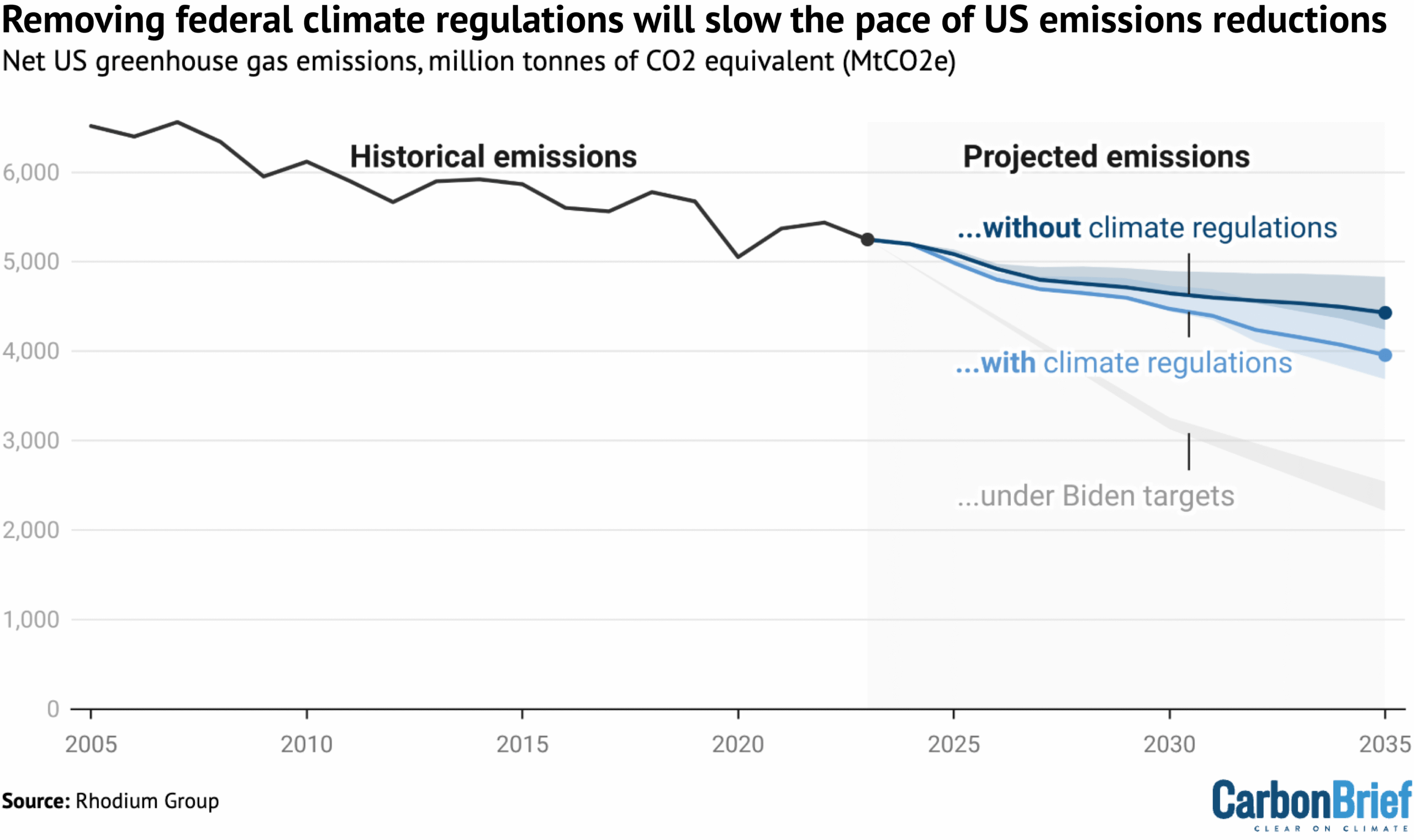
Repealing the US’s landmark “endangerment finding”, along with actions that rely on that finding, will slow the pace of US emissions cuts, according to Rhodium Group visualised by Carbon Brief. US president Donald Trump last week formally repealed the scientific finding that underpins federal regulations on greenhouse gas emissions, although the move is likely to face legal challenges. Data from the Rhodium Group, an independent research firm, shows that US emissions will drop more slowly without climate regulations. However, even with climate regulations, emissions are expected to drop much slower under Trump than under the previous Joe Biden administration, according to the analysis.
Spotlight
How a ‘tree invasion’ helped to fuel South America’s fires
This week, Carbon Brief explores how the “invasion” of non-native tree species helped to fan the flames of forest fires in Argentina and Chile earlier this year.
Since early January, Chile and Argentina have faced large-scale and deadly wildfires, including in Patagonia, which spans both countries.
These fires have been described as “some of the most significant and damaging in the region”, according to a World Weather Attribution (WWA) analysis covered by Carbon Brief.
In both countries, the fires destroyed vast areas of native forests and grasslands, displacing thousands of people. In Chile, the fires resulted in 23 deaths.
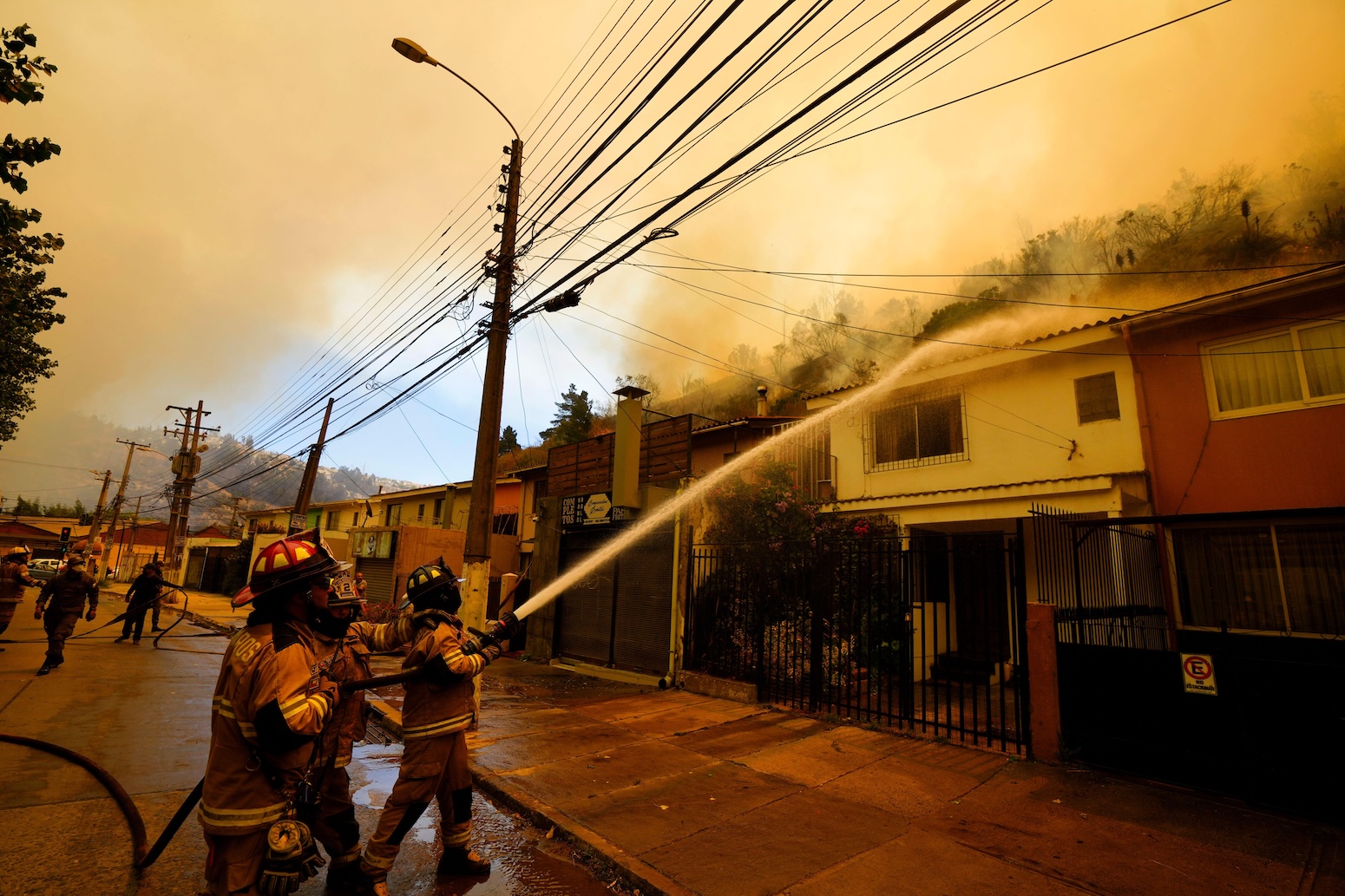
Multiple drivers contributed to the spread of the fires, including extended periods of high temperatures, low rainfall and abundant dry vegetation.
The WWA analysis concluded that human-caused climate change made these weather conditions at least three times more likely.
According to the researchers, another contributing factor was the invasion of non-native trees in the regions where the fires occurred.
The risk of non-native forests
In Argentina, the wildfires began on 6 January and persisted until the first week of February. They hit the city of Puerto Patriada and the Los Alerces and Lago Puelo national parks, in the Chubut province, as well as nearby regions.
In these areas, more than 45,000 hectares of native forests – such as Patagonian alerce tree, myrtle, coigüe and ñire – along with scrubland and grasslands, were consumed by the flames, according to the WWA study.
In Chile, forest fires occurred from 17 to 19 January in the Biobío, Ñuble and Araucanía regions.
The fires destroyed more than 40,000 hectares of forest and more than 20,000 hectares of non-native forest plantations, including eucalyptus and Monterey pine.
Dr Javier Grosfeld, a researcher at Argentina’s National Scientific and Technical Research Council (CONICET) in northern Patagonia, told Carbon Brief that these species, introduced to Patagonia for production purposes in the late 20th century, grow quickly and are highly flammable.
Because of this, their presence played a role in helping the fires to spread more quickly and grow larger.
However, that is no reason to “demonise” them, he stressed.
Forest management
For Grosfeld, the problem in northern Patagonia, Argentina, is a significant deficit in the management of forests and forest plantations.
This management should include pruning branches from their base and controlling the spread of non-native species, he added.
A similar situation is happening in Chile, where management of pine and eucalyptus plantations is not regulated. This means there are no “firebreaks” – gaps in vegetation – in place to prevent fire spread, Dr Gabriela Azócar, a researcher at the University of Chile’s Centre for Climate and Resilience Research (CR2), told Carbon Brief.
She noted that, although Mapuche Indigenous communities in central-south Chile are knowledgeable about native species and manage their forests, their insight and participation are not recognised in the country’s fire management and prevention policies.
Grosfeld stated:
“We are seeing the transformation of the Patagonian landscape from forest to scrubland in recent years. There is a lack of preventive forestry measures, as well as prevention and evacuation plans.”
Watch, read, listen
FUTURE FURNACE: A Guardian video explored the “unbearable experience of walking in a heatwave in the future”.
THE FUN SIDE: A Channel 4 News video covered a new wave of climate comedians who are using digital platforms such as TikTok to entertain and raise awareness.
ICE SECRETS: The BBC’s Climate Question podcast explored how scientists study ice cores to understand what the climate was like in ancient times and how to use them to inform climate projections.
Coming up
- 22-27 February: Ocean Sciences Meeting, Glasgow
- 24-26 February: Methane Mitigation Europe Summit 2026, Amsterdam, Netherlands
- 25-27 February: World Sustainable Development Summit 2026, New Delhi, India
Pick of the jobs
- The Climate Reality Project, digital specialist | Salary: $60,000-$61,200. Location: Washington DC
- Intergovernmental Panel on Climate Change (IPCC), science officer in the IPCC Working Group I Technical Support Unit | Salary: Unknown. Location: Gif-sur-Yvette, France
- Energy Transition Partnership, programme management intern | Salary: Unknown. Location: Bangkok, Thailand
DeBriefed is edited by Daisy Dunne. Please send any tips or feedback to debriefed@carbonbrief.org.
This is an online version of Carbon Brief’s weekly DeBriefed email newsletter. Subscribe for free here.
The post DeBriefed 20 February 2026: EU’s ‘3C’ warning | Endangerment repeal’s impact on US emissions | ‘Tree invasion’ fuelled South America’s fires appeared first on Carbon Brief.
-
Greenhouse Gases7 months ago
Guest post: Why China is still building new coal – and when it might stop
-
Climate Change7 months ago
Guest post: Why China is still building new coal – and when it might stop
-

 Greenhouse Gases2 years ago
Greenhouse Gases2 years ago嘉宾来稿:满足中国增长的用电需求 光伏加储能“比新建煤电更实惠”
-
Climate Change2 years ago
Bill Discounting Climate Change in Florida’s Energy Policy Awaits DeSantis’ Approval
-
Climate Change2 years ago
Spanish-language misinformation on renewable energy spreads online, report shows
-

 Climate Change2 years ago
Climate Change2 years ago嘉宾来稿:满足中国增长的用电需求 光伏加储能“比新建煤电更实惠”
-
Climate Change Videos2 years ago
The toxic gas flares fuelling Nigeria’s climate change – BBC News
-

 Carbon Footprint2 years ago
Carbon Footprint2 years agoUS SEC’s Climate Disclosure Rules Spur Renewed Interest in Carbon Credits





